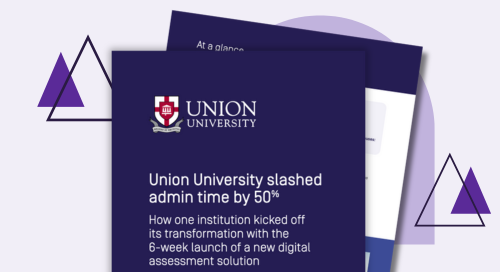

“Now, we are building a culture of continuous improvement. We don’t do this because SACSCOC tells us to; we do this because we have core values at this institution, and one of them is ‘Excellence-driven.’ Watermark Planning & Self-Study makes it easy to demonstrate outcomes.”
Michele Atkins, Associate Provost for Accreditation and Research; Title IX Coordinator, Union University
In 2020, with a SACSCOC reaffirmation on the horizon, Union University needed a new way to manage their accreditation and assessment processes. “With four campuses and 3,200 students, we had a lot of information,” said Michele Atkins, PhD, Associate Provost for Accreditation & Research and Title IX Coordinator at Union University. “We had a brand new administration and were dealing with Word documents and PDFs. It was extremely time-consuming to build and create reports using our internally developed, secure website.”
“The transition was almost too easy,” Dr. Atkins said. Union University created a digital accreditation and assessment reporting process with Watermark software, transitioning to Watermark Planning & Self-Study in just six weeks. “It was all on our timetable, and if we needed additional support, Watermark was there.”
“I was working 80-hour weeks to complete our reaffirmation report, and Watermark made it possible for my teammates and me to get the work done during our 40-hour week,”
Dr. Atkins said. “We created report templates in Planning & Self-Study that will allow me to write longer reports in less than half the time.”

In-depth training clarified the assessment process and Planning & Self-Study’s role in it. “Academic support found the platform very intuitive and user friendly. While one attendee was initially anxious about the shift to annual reporting, they ultimately said, ‘The Annual Cycle of Continuous Improvement provides a built-in focus each year, and Planning & Self-Study is a place for me to see our progress over time,’” Dr. Atkins said.
“Faculty members better understand how tracking these outcomes is helping them, and our non-academic units have eaten it up,” Dr. Atkins said. “Our Office of Institutional Advancement continues to grow engagement and connectivity with alumni via multiple new endeavors such as a quarterly alumni newsletter, a bimonthly alumni podcast, and the addition of an alumni Instagram account. One such endeavor this year was a targeted alumni fundraising campaign in which 211 alumni donated to provide a cup of coffee to an incoming freshman during move-in day. Out of those 211, 70 were first-time donors.”
Union continues to see the benefits of their implementation as they enjoy a seamless reaffirmation cycle. “We used Planning & Self-Study to organize, write, and submit our SACSCOC Fifth-Year Interim Report, which was due in March 2023. It was a smooth process from beginning to end,” said Dr. Atkins. “From a customer service perspective, we wanted a feature in accreditation management that was not there. We asked Watermark if it would be possible to add the feature. It was added within a couple of weeks.”

See how our tools are helping clients right now, get in-depth information on topics that matter, and stay up-to-date on trends in higher ed.